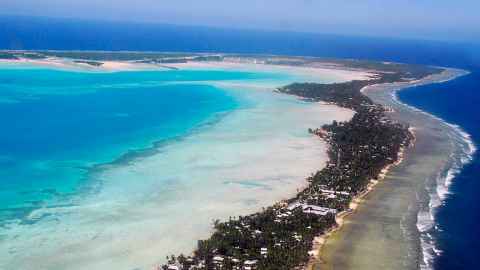Pacific defences: ocean, isolation and lockdown
8 April 2020
Opinion: The natural isolation of some Pacific islands could give protection from Covid-19 provided movement of people is strictly controlled, says Collin Tukuitonga.

The natural isolation of small Pacific islands set in the huge Pacific Ocean could prove to be the defining factor if these vulnerable nations manage to remain free of Covid-19. There is every reason to be optimistic if these small nations can keep rigid restrictions in place.
Of course, the entire region has not escaped Covid-19.
Confirmed cases have been climbing, mainly from US and French territories where lockdowns have been less strict. Fiji is the exception where (at the time of writing) 12 cases have been reported but the country is managing the pandemic actively. There has also been one report from PNG.
But most islands so far remain Covid-free – 12 altogether including New Zealand’s realm nations of the Cook Islands, Niue and Tokelau. The socioeconomic situation and fragile health systems in many Pacific nations is such that every effort must be made keep the virus out of the country. This is entirely possible for these many small island nations and must be the primary goal because an outbreak will overwhelm their health systems and it is highly unlikely assistance from outside the region (as seen with the recent measles epidemic in Samoa) would be feasible as the health systems of nations that would help will be stretched.
So what is being done so far to protect the region?
At this stage every Pacific nation has implemented restrictions on the movement of people into and within their respective countries. Several Pacific nations have declared States of Emergency to enable them to prepare for the pandemic. Vanuatu, PNG, Tuvalu and the Solomon Islands have made the SOE Declaration in the last week. Samoa, Tonga, Republic of the Marshall Islands and the Federated States of Micronesia have completely sealed their borders. The Fiji government has locked down the nation's second biggest city of Lautoka where the first case was reported in addition to other restrictions. The Cook Islands and Niue have placed restrictions on mass gatherings and other activities.
What more should be done?
All Pacific nations should consider closing their borders and reducing the movement of people to all but essential services only. Isolation offers the best prospect of maintaining a Covid-19 free status in the small islands. Many of these islands have stories of multiple deaths from diseases introduced by visitors. Residents on Niue recently mounted a protest against continuing flights in order to protect their islands.
In nations where Covid-19 cases have been reported, it is essential that the recommended actions are strictly applied such as hand washing, social distancing, case finding, contact tracing, bans on mass gatherings and other restrictions to personal movements. The consensus is that these measures are important in limiting the spread of Covid-19 and will buy us time until vaccines or other treatments come on stream. Moreover, they are effective.
These measures are also important because health systems in most Pacific nations are fragile with severe limitations in capacity and capability. Most nations do not have the facilities to care for those with severe illness, and especially those needing ventilation. Risk of severe illness is compounded by the high prevalence of chronic conditions such as diabetes, asthma and certain cancers.
It is important that these measures are maintained and enforced if required. Restrictions on the movement of people will provide the best protection for these small island states and they must be kept in place for as long as the threat from this virus remains.
Dr Colin Tukuitonga is the inaugural Associate Dean Pacific at the Faculty of Medical and Health Sciences.
This article reflects the opinion of the author and not necessarily the views of the University of Auckland.
Used with permission from Newsroom Pacific defences: ocean, isolation and lockdown 10 April 2020.
Media queries
Alison Sims | Research Communications Editor
DDI 09 923 4953
Mob 021 249 0089
Email alison.sims@auckland.ac.nz